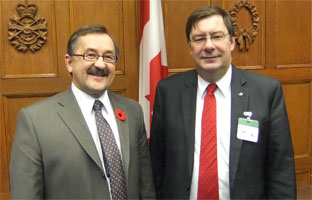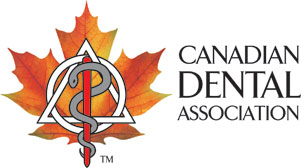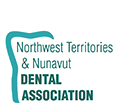 Ed Komarnicki (left), Conservative MP for Souris-Moose Mountain, Saskatchewan and chair of the Standing Committee on Human Resources, Skills and Social Development and the Status of Persons with Disabilities, with Dr. Benoit Soucy, CDA director of clinical and scientific affairs.
Ed Komarnicki (left), Conservative MP for Souris-Moose Mountain, Saskatchewan and chair of the Standing Committee on Human Resources, Skills and Social Development and the Status of Persons with Disabilities, with Dr. Benoit Soucy, CDA director of clinical and scientific affairs.
In November, CDA was invited to make a presentation to the members of Parliament who sit on the House of Commons Standing Committee on Human Resources, Skills and Social Development and the Status of Persons with Disabilities, to help clarify the licensure process used in Canadian dentistry as it relates to internationally trained dentists.
This committee is currently conducting hearings about possible strategies the federal government could implement to integrate foreign-trained workers from a variety of health professions into the Canadian workforce. CDA was asked to present, along with the Royal College of Physicians and Surgeons of Canada and the Canadian Institutes of Health Research.
Dr. Benoit Soucy, CDA director of clinical and scientific affairs, outlined the role of education, accreditation, certification and licensure in a process designed to guarantee that dentists entering practice in Canada have the training and skills required to deliver safe and effective dental care.
He further explained that for foreign-trained dentists, the goal was first to establish their equivalence to graduates from programs accredited by the Commission on Dental Accreditation of Canada. This would then allow them to take the same licensure examination as graduates from accredited programs.
To facilitate the verification of such equivalency, Canada has established mutual recognition agreements with countries that employ similar accreditation systems. Currently, Canada has formal reciprocal agreements in place with the United States and Australia and has plans to extend agreements to New Zealand and Ireland. For graduates of countries where no mutual agreements exist, the National Dental Examining Board of Canada offers an examination process that establishes equivalency on an individual basis.
CDA was pleased that the federal government consulted with the dental profession prior to making any future policy decisions.











